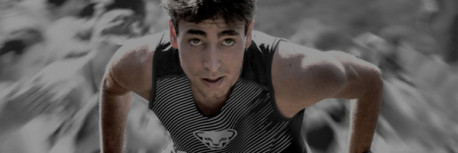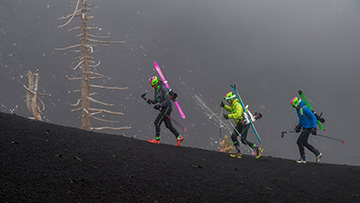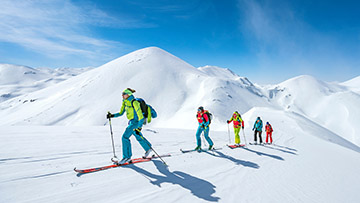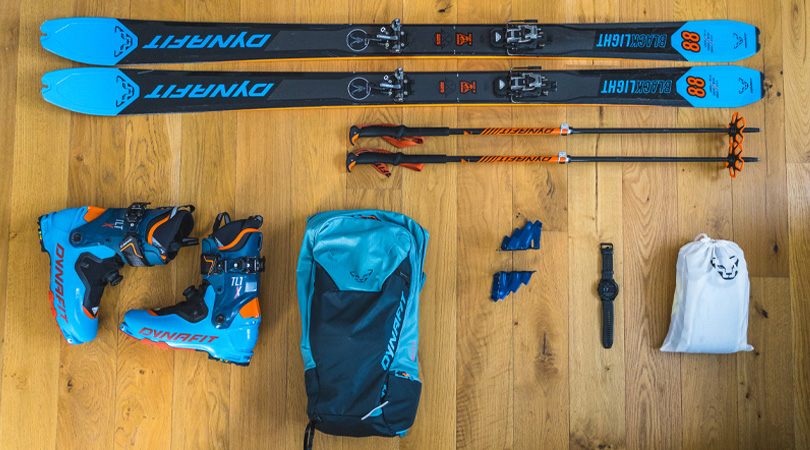Ski touring and mental health: 5 positive effects on the psyche
Ski touring promotes physical fitness and health. It puts demands on your entire musculature; your cardiovascular system is trained; and your overall conditioning is strengthened. Ski touring is not only good for your body, however, it is also good for your mind. We’ll share with you here five positive effects of ski touring on your mental health. #SPEEDUP for a more fit body AND spirit!
Stress reduction and positive eustress
Clear mountain air, a picturesque winter landscape, and fresh snow that scrunches under your skis: After a stress-filled week a ski tour is just right to help quiet your mind. Your mind focuses on the climb or the descent, and other thoughts disappear quickly into the background.
Ski touring not only can reduce negative stress, it can at the same time release so-called “eustress.” That is a type of positive stress that in contrast to traditional stress produces positive feelings. It is for example evoked during athletic activities. Eustress increases physical and mental performance ability and sharpens perception. Eustress can lead to the release of happiness hormones and is also valued positively after a successful performance. That good feeling to have achieved something normally sticks around a long time – even when you are back at home and sitting on the couch.
Increasing your subjective feeling of well-being
The effects of a one-week ski holiday on body and mind were researched in a study by the Institute of Sports Medicine, Alpine Medicine and Health Tourism (ISAG) at the Tyrol Clinic in Innsbruck, Austria, and UMIT (Hall, Austria). It showed that ski touring significantly increased the well-being of participants. After every ski tour, a mental high was noted that increased over the course of several days. The study also showed positive effects on the feeling of recovery and a clear reduction of the subjective feelings of exertion. Even social well-being – a key aspect of mental health – improved after a week’s ski vacation. Social interactions increased – a trend that continued for at least two weeks after the holiday.
Meditative flow state and balance
Ski touring can also produce flow states and contribute to emotional balance. “Flow” is a mental state that is perceived extremely positively. In this state, you are so engrossed in your activity that you begin to “flow,” similar to a trance or a meditative state.
The rhythmic, constant climbing movement combined with a nearly silent setting as well as having a clear goal makes it easier to move into a flow state. Once in a flow state, anything other than your activity is largely forgotten. You become one with your surroundings and are totally in the here and now. In order to find this balance, it is important that the ski tour is appropriate for your ability and not too challenging. Otherwise, your thoughts quickly revolve only around the risks.
Self-efficacy and self-confidence
Ski touring always comes with a certain level of risk and thus it is ideal to learn willpower, self-discipline and stamina and have decision-making abilities. What you do has a direct effect on you and your environment. You find out what you yourself can achieve and are capable of. This manner of self-efficacy can increase your self-esteem enormously. Interacting with risk or conquering challenges can also be very educational and can contribute to strengthening your self-confidence and autonomy. Ski touring is also a perfect teacher when it comes to strength of your nerves, resilience and stamina. These characteristics help you not only for sports but also in your personal and professional everyday life.
Sense of belonging and social competency
On a ski tour, you are usually not alone, but in a group or with a partner. You share experiences of joy and success as well as challenging moments that you conquer together. In doing so, an excellent ability to communicate, consideration for others as well as tolerance and a readiness to assist are demanded in order towork as a team. The sense of belonging to a community is a fundamental human need and a vital factor of mental health. Support and acceptance are essential for every individual and contribute significantly to well-being. Experiences on the mountain and as part of a rope team allow the creation of strong feelings of community and are like a tailwind.
First-hand story: Gela Allmann and Jakob Herrmann discuss ski touring and psyche
What do our athletes think about ski touring and mental health? We posed that question to Gela Allmann and Jakob Herrmann:
“Job, family, home and an endless to-do list. With our stress-filled everyday lives, how to find time for yourself and sports? Just when you have the feeling that you are in over your head, it is enormously important to take a time-out and not remain a prisoner of your own mental chatter. In the mountains, in particular when ski touring, my mind is free again. That great feeling to have achieved something, to have given your all, in a good sense, and to have had a fantastic time with friends gives me strength. Then I can give 100 percent of my energy to my family and my other tasks.” – Gela Allmann
“Ski touring is a type of meditation. This is when my mind quiets, and I am completely focused on myself and the mountain. After my record 24-hour ski mountaineering success, I was often asked how I did it. For me, that is a prime example of what you all can achieve in this unique flow state that I only know from sports.” – Jakob Herrmann



















